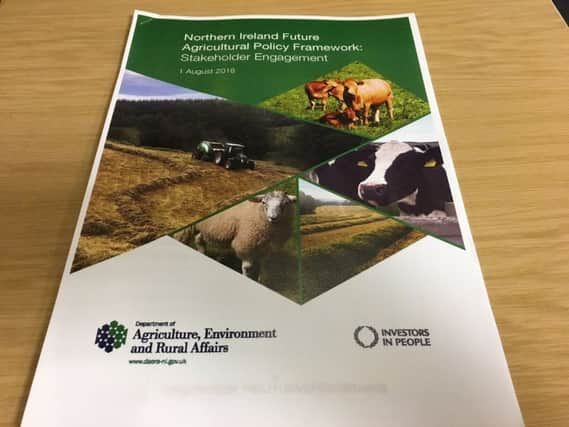Farming stakeholders urged to have their say on future policy


In a review that represents the biggest change to the industry over the last 40 years, the Department of Agriculture, Environment and Rural Affairs (DAERA) is to engage with the wider farming, food and environment sectors on proposals for the future agricultural policy framework for Northern Ireland.
Brexit is the driving force here with the current Common Agricultural Policy (CAP) no longer applicable to Northern Ireland once the United Kingdom leaves the European Union.
Advertisement
Hide AdAdvertisement
Hide AdAs it stands, 2019 is the final year of CAP with a transition period to a domestic agenda taking place through 2020.
It is against this landscape that stakeholders are being urged to come forward and make their views known on a ‘Future Agricultural Policy Framework’ document, which has been released today, and is designed to help shape debate on future support arrangements.
Norman Fulton, Deputy Secretary Food and Farming Group at DAERA, said: “Following our initial and very informative engagement with a number of stakeholders representing farming, food and environmental interests, we are now seeking views from across a much broader range of stakeholders on possible support arrangements in Northern Ireland as we prepare to leave the EU.
“CAP payments have been important in sustaining the industry, underpinning its competitive trading position and developing its environmental performance, so it is essential that the industry in Northern Ireland is provided with some certainty in relation to future support arrangements in the shorter term. There is also a need to develop a longer term agricultural policy framework and deliver a managed transition over a number of years.
Advertisement
Hide AdAdvertisement
Hide Ad“I would encourage all those with an interest to consider the framework document and to forward their views to the department by October 10.”
The framework document focuses on four desired outcomes for the Northern Ireland agricultural industry, namely increased productivity, improved resilience, environmental sustainability and supply chain.
A DAERA spokesman said the document represented the ‘start of a journey’ for Northern Ireland agriculture.
He added: “We are not seeking to constrain options for any future Executive, we are seeking to gather information for future ministers. Any policy decisions would be taken by future ministers.
Advertisement
Hide AdAdvertisement
Hide Ad“This document is designed to stimulate debate. It deals with broader matters, however further consultation would be expected to deal with more specific issues.”
Among the suggestions contained within the document are how payments and entitlements would be handled going forward, including changes to the Basic Payment Scheme. The options include continuing the current transition towards a flatt rate payment by 2021 or freeze the value of entitlements at the end of 2019, which see the value of entitlements remain the same for 2020 and 2021. There is also scope to change the Greening requirements which are currently relevant to only a small sub-set of local farmers.
Greater emphasis is being put on education throughout the industry with a desire to see level 3 qualifications obtained by business owners and further professional development options being made available.
A ‘Productivity Grand Challenge’ approach towards science and innovation is suggested which might include a multi-actor approach of science, innovation, knowledge transfer, education, policy and industry.
Advertisement
Hide AdAdvertisement
Hide AdIn terms of a improved resilience for the industry, the payment of a basic farm resilience support measure is an option. However there is concern that such payments might reduce the drive to innovate and reduce the incentives to manage business risks.
It is recognised that an organised transition is required from the current CAP regime, which is dominated by income support, to a new domestic arrangement.
Environment remains an important issue, however, and the document seeks to develop regulations which while simpler than those currently in place would encourage ‘positive behavioural change’ and would secure the long-term environmental sustainability of the sector.
The Northern Ireland Future Agricultural Policy Framework Stakeholder Engagement document is available on the DAERA website - www.daera-ni.gov.uk/consultations/northern-ireland-future-agricultural-policy-framework